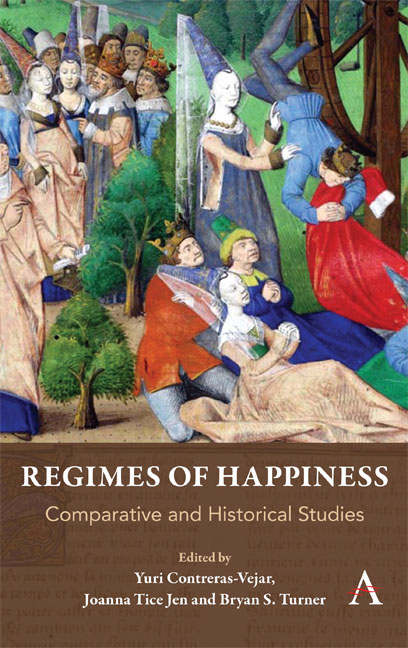Book contents
- Frontmatter
- Contents
- Acknowledgements
- Notes on Contributors
- Introduction: Reflections on Regimes of Happiness
- Part I Happiness in the West
- Part II Comparative Perspectives
- Chapter Ten And You Should Be Nothing but Happy: Judaism and the Dual Approach to Joy
- Chapter Eleven Happiness in Medieval Islamicate Literature: Conceptual and Practical Problems
- Chapter Twelve From Liberation to Happiness: The Making of Modern, Middle-Class Yoga
- Chapter Thirteen The Pursuit of Happiness in Vietnam
- Chapter Fourteen Indigenous and Western Views of Happiness: An Essay on the Politics of Contentment
- Chapter Fifteen A Nineteenth-Century Turning Point: Nietzsche, Weber, Freud and Mill
- Index
Chapter Eleven - Happiness in Medieval Islamicate Literature: Conceptual and Practical Problems
from Part II - Comparative Perspectives
Published online by Cambridge University Press: 29 May 2019
- Frontmatter
- Contents
- Acknowledgements
- Notes on Contributors
- Introduction: Reflections on Regimes of Happiness
- Part I Happiness in the West
- Part II Comparative Perspectives
- Chapter Ten And You Should Be Nothing but Happy: Judaism and the Dual Approach to Joy
- Chapter Eleven Happiness in Medieval Islamicate Literature: Conceptual and Practical Problems
- Chapter Twelve From Liberation to Happiness: The Making of Modern, Middle-Class Yoga
- Chapter Thirteen The Pursuit of Happiness in Vietnam
- Chapter Fourteen Indigenous and Western Views of Happiness: An Essay on the Politics of Contentment
- Chapter Fifteen A Nineteenth-Century Turning Point: Nietzsche, Weber, Freud and Mill
- Index
Summary
What is happiness and how can I attain it? In order to explore how authors of the medieval Islamicate world answered such questions we have to find our way through a maze of fundamental hermeneutical problems, beginning with lexicographical and extending into conceptual areas: Which terms are we looking for? Which texts should we take into consideration? How do we establish which testimonies qualify as pertinent? Are we dealing with a singular discourse or multiple discourses? To what extent does our own understanding of happiness prefigure our selection, and how can we historicize past discourses on happiness, in particular if we have not yet determined the conceptual parameters?
From all that we know, Muslim authors of the medieval period did not spill a lot of ink on what happiness is and how it can be achieved. To be sure, happiness in the sense of human fulfilment in the shape of salvation was an important notion in medieval Arabic or Islamic literature as were other issues often associated with happiness such as laughter or humour. Psychological and emotional well- being and their opposites figured in medical writing, but it does not seem as if many texts had the definition and attainability of happiness as their main concern. An intellectual and literary tradition which paid some attention to happiness was philosophy, here understood to render falsafa, the Islamicate adaptation of classical and late antique learning. Modern surveys of philosophical literature produced in the medieval Islamicate world tend to operate with Aristotelian or Platonic ideas of happiness and focus on the reception of those concepts, which was indeed significant (Goodman 2014; Rosenthal 1958, 13–20). As will be argued in what follows, however, this focus deserves reconsideration, especially if philosophical texts are read as contributions to a larger debate outside the narrow circle of falāsifa (Arabic: philosophers). For pragmatic reasons, happiness is here understood more broadly as human fulfilment, usually connected with a joyful experience.
Authors commonly classified as philosophers had mostly one answer to offer to the first question, what is happiness: For the vast majority, true happiness (Arabic: saʿāda) was inextricably connected to our human purpose, which is salvation, although debates surrounded the nature of happiness in this world compared to that in the next as well as the nature of otherworldly felicity (Lange 2016, 165–91).
- Type
- Chapter
- Information
- Regimes of HappinessComparative and Historical Studies, pp. 171 - 186Publisher: Anthem PressPrint publication year: 2019

